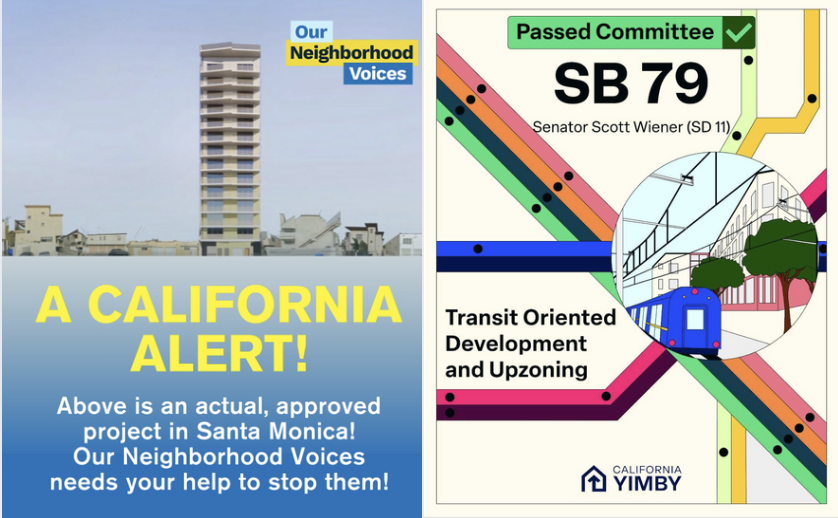As the legislature returned to session last week, Senate Bill 79, the Abundant & Affordable Homes Near Transit Act introduced by Senator Scott Wiener (D-SF), was one of the pieces of legislation taking center stage.
SB 79 would automatically upzone land within a quarter of a mile of rail stations, major bus stops, and ferry terminals. It would allow for transit agencies to build with greater density than local zoning on their own property, and would streamline transit-oriented development approval processes. Within a half-mile of stations, SB 79 would establish ministerial (non-discretionary) approval for developments that conform to local zoning and inclusionary housing rules.
Last week, the largest city in the state officially took a position against SB 79 when a split Los Angeles City Council voted 8 to 5 (with two members not present) to oppose the bill. Mayor Karen Bass quickly approved the city stance in opposition to the legislation, and explained her position on social media.
Today I signed a City Council resolution opposing SB79 unless it is amended to exempt cities with a state-approved and compliant Housing Element.
— Mayor Karen Bass (@MayorOfLA) August 20, 2025
While I support the intent to accelerate housing development statewide, as written, this bill risks unintended consequences for LA.
While Los Angeles does have a “state-approved and compliant Housing Element,” it has been falling far short of meeting its goals for building new housing. Last year the city approved over 17,000 new units of housing. It needs to approve an average of 57,000 units per year to meet its requirements under state law.
Support and opposition to SB 79 didn’t fall clearly along ideological or geographic lines in Los Angeles. The vote saw the representatives of the more upper-class parts of the city, West Los Angeles and the an Fernando Valley, ally with a progressive councilmember representing East Los Angeles to oppose the legislation. Councilmembers representing South Los Angeles were also split. South L.A. is where Bass began her political career and earned the highest share of the vote in her mayoral election.
Los Angeles is hardly alone in opposing SB 79. The bill is endorsed by a handful of relatively progressive Westside cities in L.A. County - including Culver City, Santa Monica, and West Hollywood. Most California Cities that have weighed in on SB 79 oppose it. For an updated list of who supports and who opposes SB 79 visit Digital Democracy.
But SB 79 picked up a big boost over the weekend when the California Democratic Party voted 111-62 to endorse. That's an outcome that Wiener referred to as “unthinkable” just a few years ago. Delegates to the state convention are selected in every Assembly and Senate district by members of the party during the election. Housing has been one issue that has divided Democrats for years.
Following the vote, Katie Porter, a former Orange County Congressmember who is leading (albeit barely) polls in the Governor’s Race, also signaled her support.
Katie Porter, the current frontrunner to be California's next governor, has come out in favor of SB 79.
— Joe Cohen (@cohenhouse.bsky.social) 2025-08-25T00:56:57.937Z
Since the last time Streetsblog covered SB 79, the legislation was amended in a major way. Previously, the act mandated how much land near stations would be upzoned, but the new language allows cities flexibility based on how close the land is to the transit stop and how much development exists and is planned for near the stop. Palo Alto Online explains that cities with progressive housing policies and zoning could cap the size of buildings as low as 45 feet, while others could see buildings as tall as 95 feet.
SB 79 has already passed the Senate, and needs to clear the Assembly Appropriations Committee before coming to a final Assembly vote, and then to the Governor’s Desk.
Earlier Streetsblog coverage of SB 79:
Wiener’s Legislation to Upzone Near Transit Clears the Senate (Barely), June 5
Wiener’s Controversial Legislation to Upzone Near Transit Keeps Moving with One Major Change, May 12
Wiener Introduces Legislation to Increase Housing Density Near Transit, March 17






